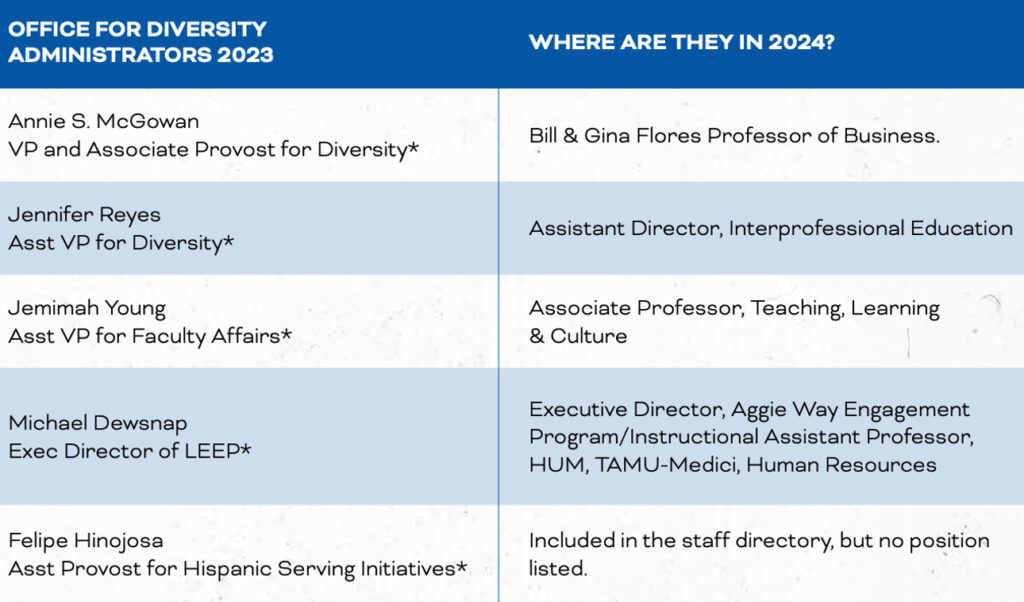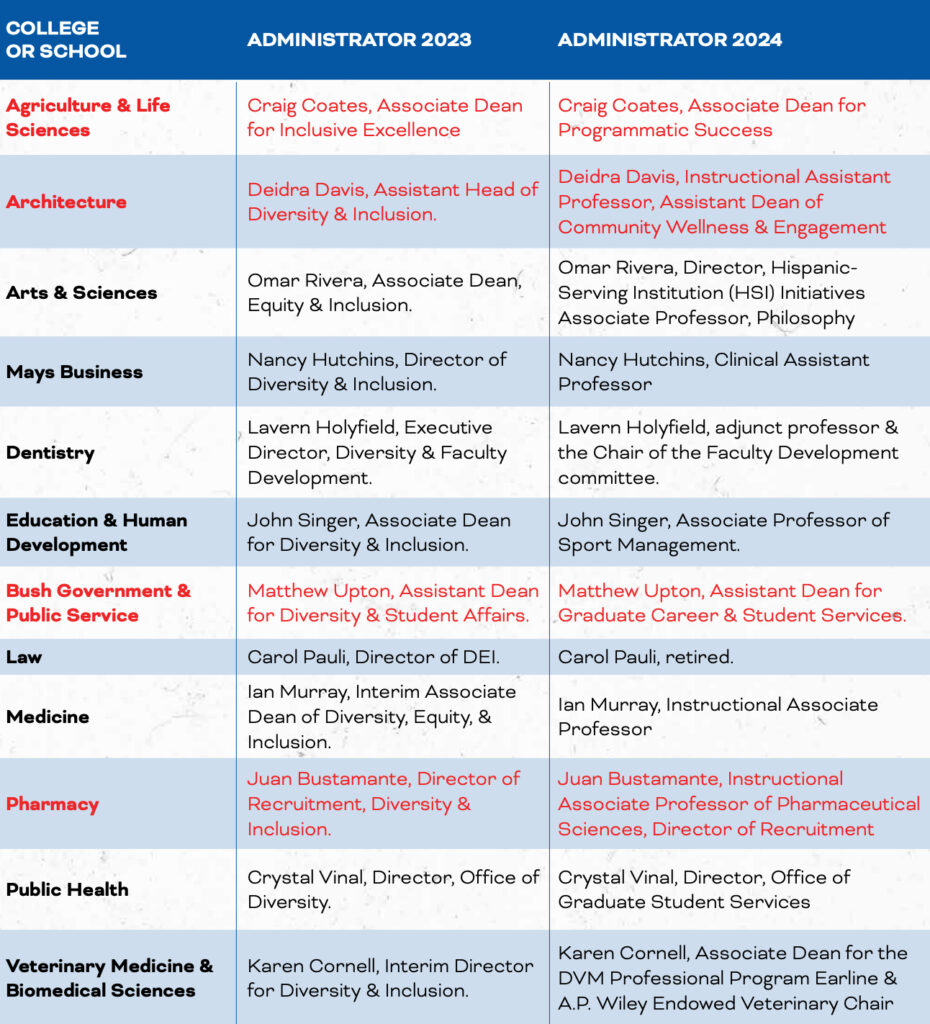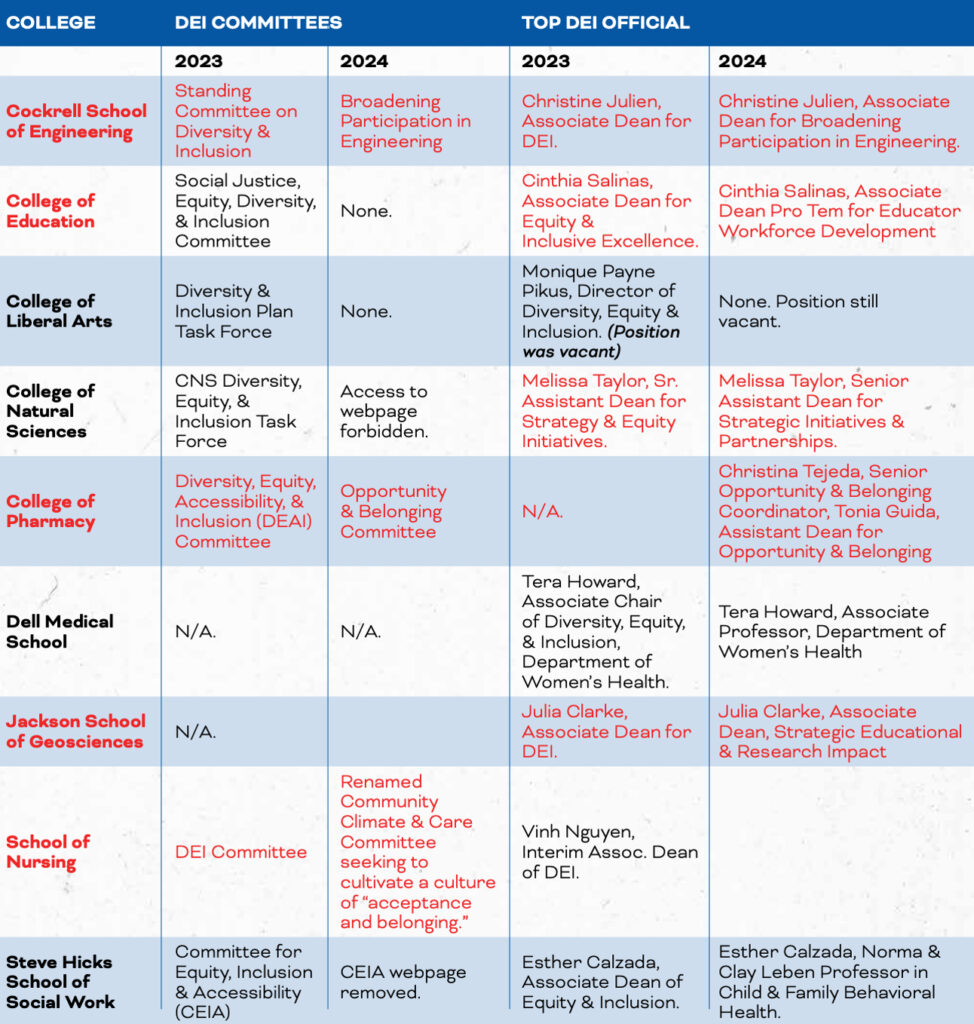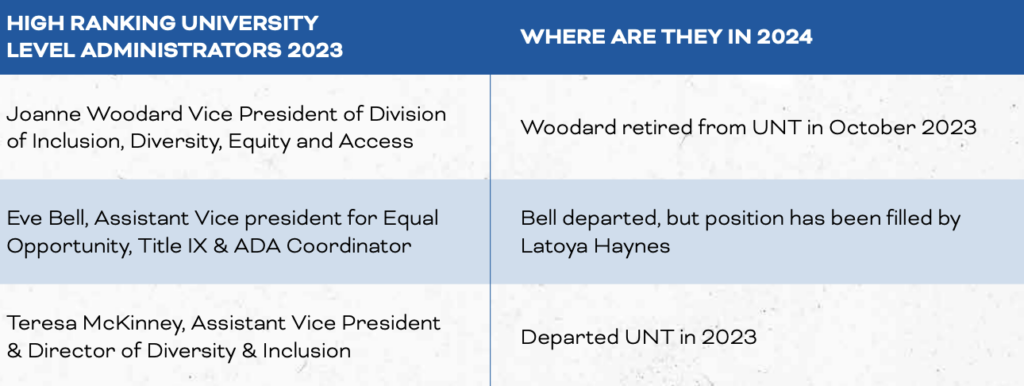
WHERE ARE THEY NOW?
Preliminary Study on How Texas Universities Responded to DEI Bans
Click here to view a PDF version of this article.
The Texas legislature passed SB 17 in Spring 2023. The bill aimed to ensure that colleges and universities in Texas did not “establish or maintain a diversity, equity, and inclusion office” or promote “differential treatment of or providing special benefits to individuals on the basis of race, color, or ethnicity.” The bill went into effect January 1, 2024.
I surveyed Texas public universities in 2023 to create a baseline against which to measure any changes in practice. Universities then displayed plans and personnel proudly on university websites. In 2023, University of Texas, Austin (UT) and Texas A&M were the DEI leaders in Texas, while Texas Tech, University of Houston, and University of North Texas were at the next level below.
Texans must now track university compliance with SB 17. The first pass at measuring such compliance is seeing how the plans and personnel have changed on university websites. Texas universities have acted with varying degrees of compliance to SB 17, from outward appearances. Texas A&M has been most compliant with the legislature’s wishes, in the sense that it appears to have dismantled its central DEI offices and removed personnel from key diversity positions. UT has been most defiant, merely renaming its biggest diversity office, keeping its radical diversity plans on-line, pledging adherence to DEI ideology, and (seemingly) hiding other DEI efforts out of public view. University of Houston, Texas Tech and University of North Texas have done more than a little compliance, as this report documents.
In what follows, I track how Texas’s top universities have adapted to the new circumstances. I provide a scorecard or description for each of these five universities, beginning with an executive summary and charts about personnel that illustrate the changes at the universities. Highlights include:
- UT rebranded its diversity bureaucracy from Division of Diversity and Community Engagement to the Division of Campus and Community Engagement.
- UT still has almost all of its DEI strategic plans active on its websites.
- 4 out of 12 college-level DEI administrators at Texas A&M have merely received new titles but have kept their DEI emphasis. Those numbers are 5 out of nine at UT; 2 out of three at Texas Tech; and 2 out of 2 at Houston.
There are still questions about whether the defiant universities are merely hiding DEI efforts. Executive officials and boards in Texas must ask searching questions of their universities to discover if their public presentation of compliance matches reality. For instance, are personnel formerly engaged in DEI activity in college committees getting course releases for continued DEI work? Punishing UT personnel according to Texas law is imperative if SB 17 is going to succeed.
Furthermore, Texas should undertake curricular reform, ensuring that its general education mission of providing American history is fulfilled and creating oases of traditional learning on campus as has been done with Florida’s Hamilton Center.
Texas A&M
Texas A&M promised compliance and mostly delivered it, according to publicly-available evidence. President Katherine Banks (June 26, 2023) promised compliance: “Texas A&M University is working with The Texas A&M System Office of General Counsel to address Senate Bill 17. . .and will implement necessary changes accordingly.” Her successor, Mark Welsh (August 25, 2023), endorsed much the same sentiment, though he questioned the wisdom of SB 17: “We will work with the System to ensure full compliance by Jan. 1, 2024. Our individual differences make this university stronger, and as we navigate the implications of S.B. 17, I want to be clear that we are committed to maintaining a welcoming environment for all and a world-class educational experience for our students.” The Texas A&M System offered a Guidance Statement on September 17, 2023, promising that “staff members previously supporting the Office of Diversity have been reassigned, and this office is now closed” and that “University policies and related documents are undergoing revisions to ensure compliance.”
Its Office of Diversity is now closed and its personnel dispersed and assigned to different duties, as demonstrated in Table 1. The Office of Diversity has not merely been renamed. The former Vice President and Associate Provost for Diversity, Annie McGowan, is now back to teaching in the business school. Jeremiah Young, former Assistant Vice President for Faculty Affairs in 2023, is teaching also. Compliance appears to trickle down to the college level too, according to publicly-available evidence. Nevertheless, as demonstrated in Table 2, some of the top college-level DEI administrators may have simply assumed new names and are, most likely, doing what they were doing before under a clever disguise. Of the twelve colleges that had DEI deans in 2023, four have made what appear to be only paper changes to their diversity administrators. One diversity director retired. Others now have faculty designations.
It is remarkable that Texas A&M had adopted such a radical DEI agenda by 2023, as I documented last year. Equally remarkable is how much of the DEI institutions have disappeared from A&M’s websites. The 2010 Diversity Plan is no longer available on the university’s website. Nor is the even more radical 2020 State of Diversity Report on the university website. Last year, roughly eight colleges either had DEI in their strategic plans or had special DEI plans. Now, only the College of Veterinary Medicine & Biomedical Sciences has a DEI plan. Last year, twelve of the sixteen colleges had college-level committees dedicated to DEI. Now, again, only the College of Veterinary Medicine & Biomedical Sciences has a committee so dedicated.
Table 1: Where Texas A&M’s 2023 Central Administrators Dedicated to DEI are after SB 17.

Table 2: Where Are Texas A&M’s 2023 Top College-Level DEI Administrators after SB 17 Implementation? (What appear to be merely paper changes are highlighted in red.)

University of Texas, Austin: Strategic Obfuscation and Defiance
UT is the Texas university that most proudly embraces left-wing ideology including DEI. Its administration is committed to the DEI project, and much evidence shows that UT is daring higher education regulators to stop it. UT’s strategic plans for DEI remain in place. “The primary objective of the strategic plan is to attract, recruit, and employ diverse faculty.” Its Strategic Plan for Faculty Diversity, Equity, and Inclusivity (approved April 2021) still promises “(1) to recruit “diverse faculty”; (2) retain and promote a diverse faculty; (3) establish “an equitable and inclusive climate”; and (4) support “diverse scholarship.” It still promises “diversity hiring training.” It still insists that colleges have diversity plans and “should consider hiring at least one trainer to ensure that best practices in DEI are followed at every step of the way.” The Change Starts Here Strategic Plan remains on the website as well. It promises to “develop a pipeline of future graduate students to advance diversity and equity across the academy” and to “develop a university-wide faculty hiring and retention vision across titles and ranks that is directly linked to our teaching, research, impact, and DEI strategies.”
UT President Jay Hartzell is pretty defiant in the face of SB 17, though he chooses his words carefully. As the bill was under consideration, Hartzell told Hearst Newspapers: “We’re all looking for ways to have a diverse, vibrant campus that works for all our students, all of our community, and do that in a way with excellence.” After it was passed, he promised compliance and defiance: “It is important to remember that even while we are complying with the new law and policy, many things will not change — including our commitment to attracting, supporting and retaining exceptional talent across diverse backgrounds and perspectives, celebrating the collective strength of our community, and fostering a sense of belonging for all Longhorns.”
President Hartzell has rebranded UT’s Division of Diversity and Community Engagement into the Division of Campus and Community Engagement. In 2023, Suchitra Gururaj headed the Division of Diversity and Community Engagement and she has not changed her title on her LinkedIn profile, though today she is officially the Assistant Vice President for Community Engagement and Economic Development.
UT’s DEI apparatus remains in place at the college level. UT has fifteen colleges. In 2023, ten colleges had publicly-available DEI plans or had DEI in their strategic plans. In 2023, all but two colleges had a DEI committee listed on their website and all but two had at least one DEI director at the college level. In 2024, there is mostly strategic obfuscation. Only the Jackson School of Geosciences, The Dell Medical School, the College of Pharmacy and the Cockrell School of Engineering have maintained their diversity plans. The Cockrell School of Engineering had a Standing Committee on Diversity and Inclusion; now it has a webpage dedicated to Broadening Participation in Engineering. The College of Pharmacy had a Diversity, Equity, Accessibility, & Inclusion Committee; now it has an Opportunity and Belonging Committee. See Table 3 for examples. Five colleges have functional equivalents of DEI administrators.
Table 3: Where Are UT’s 2023 College-Level DEI Committees and Top College-Level DEI Administrators after SB 17 Implementation? (What appear to be merely paper changes are highlighted in red.)

Texas Tech University
Texas Tech had a significantly smaller DEI presence than A&M and UT in 2023. Its president, Lawrence Schovanec, surprisingly was more defiant about SB 17 than any other president in Texas. He basically promised to shuffle DEI personnel around into other departments without changing their job descriptions overmuch. Soon after the law was passed, Pres. Schovanec released a statement (July 19, 2023) saying that “Some units previously housed under the Division of Diversity, Equity & Inclusion have been moved to better align with the audiences they serve.” He promised to move faculty recruitment and hiring to Faculty Success and student-success focused units into Academic Innovation and Student Success departments. He promised much the same thing after SB 17 went into effect. “We’re gonna move certain support services into certain areas that align with really who they served and what they did,” Pres. Schovanec said on January 10, 2024.
Still, Texas Tech’s leading DEI administrator left her position soon after SB 17 passed. It also scrubbed its website of almost all college-level DEI plans and personnel. In 2023, 7 out of eleven colleges had DEI plans at Texas Tech; six of the eleven had DEI committees, and 2 had college level DEI administrators. Some of those numbers changed since SB 17, according to a search of college websites. Only 2 colleges still post their DEI plans and no college has a DEI committee listed on its website. However, the two DEI administrators have what appear to be only paper changes in their jobs. Amelia E. Talley was Associate Dean of DEI in the College of Arts and Sciences in 2023; now she is Associate Dean for Campus Access & Engagement and an Associate Professor. Julia Heard Witt was a LEAD Fellow in the College of Media and Communication in 2023; now she is the senior director for advising.
Most concerning, however, about Texas Tech is the fact that its DEI Strategic Plan, A Foundation for the Next Century, A Pathway to 2025, which promises to “advance and sustain a campus climate and culture characterized by accessibility, inclusiveness, and high academic quality” and to “improve the quality and diversity of the incoming student body” is still publicly available on the university website. Its aspirations have not changed.
Table 4: Where Texas Tech’s 2023 Central Administrator Dedicated to DEI is after SB 17.

Table 5: Where Are Texas Tech’s 2023 Top College-Level DEI Administrators after SB 17 Implementation. (What appear to be merely paper changes are highlighted in red.)

University of North Texas
Elements of UNT’s reaction to SB 17 are concerning. Most concerning is the fact that the university has not withdrawn relevant portions of its University of North Texas Five-Year Strategic Plan, which promised to “expand/develop student services to encourage students’ sense of belonging, growth mindset, well-being, and mental health” and “inclusion and student success practices and policies.” This plan is still available on its website. It has also added a Center for Belonging & Engagement with a five person staff—and it is searching for a founding director. This Center is focused mainly on student life, rather than academics.
In 2023, UNT had a significant Division of Inclusion, Diversity, Equity and Access organizational chart on its website. That office is now eliminated. Top personnel in the Division have left, as can be seen in Table 6. Teresa McKinney, for instance, a subordinate, was an Assistant Vice President and Director for Diversity & Inclusion and she had a staff of five to assist her in her duties. McKinney left the university. Another in that portion of the office has been assigned to a role that sounds fishy. Vanessa Ellison was Diversity & Inclusion Trainer, but now she is Senior Program Project Coordinator for Training and Outreach. That appears to be a paper change. There are 11 colleges at UNT, one of which had a DEI administrator in 2023, three of which had DEI in their college plans and seven of which had DEI committees. In 2024, the same three still had DEI college plans. However, in compliance with SB 17, the DEI administrator in the College of Engineering has moved to central administration as the Associate Dean of Undergraduate Studies. The status of the college-level DEI committees is more ambiguous, in that most still retain websites, but there is no longer an active record of the activities.
Table 6: Where Are North Texas’s 2023 Central Administrators Dedicated to DEI after SB 17.

University of Houston
University of Houston maintains its strategic plan dedicated to DEI. Its plan, Together, We Rise. Together, We Soar, aims to provide a “top tier, inclusive education experience for all” including the embrace of graduating “more students with higher grade point averages.” Embrace “social responsibility,” understood as being equitable and inclusive. It also promises to “bolster efforts by. . .students, staff and faculty to seek social justice and racial equity.” This plan remains active on the university’s website and no changes have been made. Houston had only a relatively low-level director of the Center for Diversity and Inclusion in 2023. Today, it appears, that director is now in the Center for Student Advocacy and Community. This is mostly likely a mere paper change.
Yet Houston’s president, Renu Khator, has mostly promised compliance with SB 17. As the bill neared passage, Pres. Khator said the following: “Prior to it becoming effective in January, we will be collaborating with other Texas university systems to ensure consistent interpretation and implementation of the provisions of this legislation throughout the state. Please remember that as a public university serving an extremely diverse student body, our commitment to ensuring success for all students and building a community of care and compassion for our entire community does not change.”
While compliance looks weak at the level of the central administration, it is uneven at the college level. Houston has twelve colleges, three of which had DEI administrators in 2023, another five had DEI committees and four had DEI commitments in their college strategic plans. In 2024, the College of Education, the Katherine G. McGovern College of the Arts, C.T. Bauer College of Business, and the College of Education still have DEI commitments in their strategic plans. Of the four colleges with DEI committees, only the College of Liberal Arts & Social Sciences’s Special Committee on Race and Social Justice remains active. Two of the three college level administrators have gotten new titles, but appear to be doing the same work, as can be seen in the table below.
Table 7: Where Are University of Houston’s 2023 College-Level Administrators Dedicated to DEI after SB 17.


 Twitter
Twitter
 Facebook
Facebook